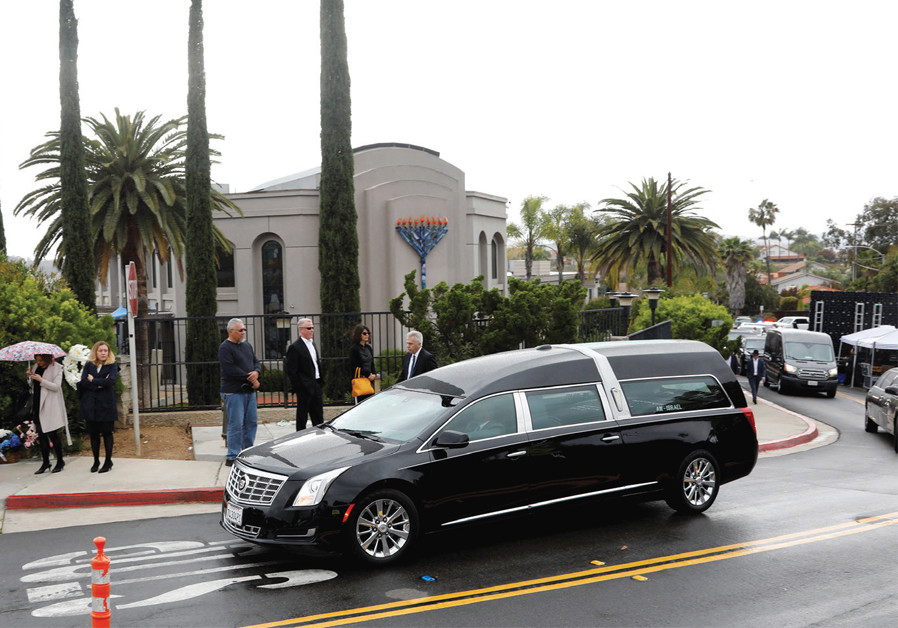Guns or no guns at synagogue?

A HEARSE carrying the body of Lori Gilbert- Kaye, the sole fatality of the April 27 synagogue shooting that also left three injured, leaves the Chabad of Poway in San Diego, California, on April 29. Nineteen-yearold white supremacist John T. Earnest shot up the Chabad in a copycat attack inspired by. (photo credit: JOHN GASTALDO/REUTERS)
There were 27 mass attacks in public spaces in 2018, according to the United States Secret Service.
One of those occurred on October 27 at the Tree of Life Synagogue in Pittsburgh, Pennsylvania, where 11 people were murdered. Exactly six months later, an individual walked into another synagogue in Poway, California, and opened fire with an assault rifle. His attack was interrupted and he fled. The reality of these attacks has forced a debate in houses of worship and within the Jewish community specifically. What is the role of guards and firearms in houses of worship?
Recently, the US antisemitism envoy, Elan Carr, stated that guards should be posted at every synagogue and Jewish community center in the US. The question was asked: Should the guards be armed?
Ask anyone in the Jewish community if they want people with guns at their houses of worship and you’ll get deeply divided opinions. From “guns are not the answer” to “the best way to stop a bad guy with a gun is a good guy with a gun,” Jewish worshipers are at odds.
In the wake of the killings at synagogues in Pittsburgh and Poway, protecting Jews in their houses of worship is no idle matter.
Regardless of what someone thinks on the issue of armed guards, action must be taken to make our synagogues safer. More importantly, guards – if a facility does have them – are only one part of a comprehensive security strategy.
Every synagogue should have a well-developed, well-practiced security plan. These plans must ensure that the Jewish community is prepared, empowered and resilient through best practices, standardized efforts that while unique to each community, are consistent in their approach. My group, the Secure Community Network (SCN), the official security organization of the Jewish community, works throughout the country to ensure exactly this.
Communities must also have access to security professionals who are responsible for developing and implementing security plans. Already, more than 40 communities have hired trained, knowledgeable experts to oversee their prevention and response efforts.
Having a close, working relationship with local, state and federal law enforcement is critical. The FBI and the Department of Homeland Security have specialized divisions that work with the faith-based community to share information, provide services and support community resiliency. Giving local police regular access to Jewish facilities allows first responders to be familiar with where to go and what to do.
WHILE SOME entities have the resources to seek complex, expensive security systems, many institutions should know that there are often low to no-cost things that they can do. Locking all doors, except one main entry and exit, is a crucial component of a security plan. Cameras can be effective, but only if they’re actively monitored by people who know what they’re looking for and know what to do if they see it.
Another essential component of a security plan is training. People must be prepared. That is why training in everything from situational awareness and active threat responses to emergency procedures and “Stop the Bleed” training is necessary.
If armed guards are a part of a security plan, then institutions should insist on having individuals who are competent and capable of keeping people safe. On-duty or off-duty law enforcement professionals, or retired law enforcement professionals who continue to meet crucial certifications under federal statute, are often the best option to ensure this.
Make no mistake: unarmed personnel are not security guards. They can be referred to as greeters or safety officers but we have to be honest about their capability. They often cannot be relied upon to perform a security function, so we shouldn’t mislead people with how we refer to them.
If a Jewish facility is relying on armed volunteers or other individuals who lack the highly specialized training to protect people in the face of a deadly threat, it can be a potentially dangerous deficiency.
Volunteers almost always lack the training – and crucial, real-world experience – necessary to know what to do in a worst-case scenario. Armed professionals, on the other hand, must undergo extensive and ongoing training in recognizing and responding to potential and active threats. That’s why they can be more expensive to hire.
All of these issues are why SCN is organizing a meeting this August of security experts to discuss when and how to hire guards, what guards to hire, and to advise communities on best practices. If a Jewish facility is going to include armed security personnel as part of its plan, there is only one way to do that – and that’s to do it carefully and wisely.
We live in a time of danger. We know threats exist. But we also know that preparation is critical to minimizing and eliminating future attacks. It must be comprehensive.
The writer is a former Marine Corps captain and the national director and CEO of the Secure Community Network. A certified police officer, he is trained in special weapons and tactics and has served on numerous task forces for the Department of Homeland Security. He previously served on the executive board of the FBI’s Chicago Joint Terrorism Task Force.
Join Jerusalem Post Premium Plus now for just $5 and upgrade your experience with an ads-free website and exclusive content. Click here>>






Comments are closed.